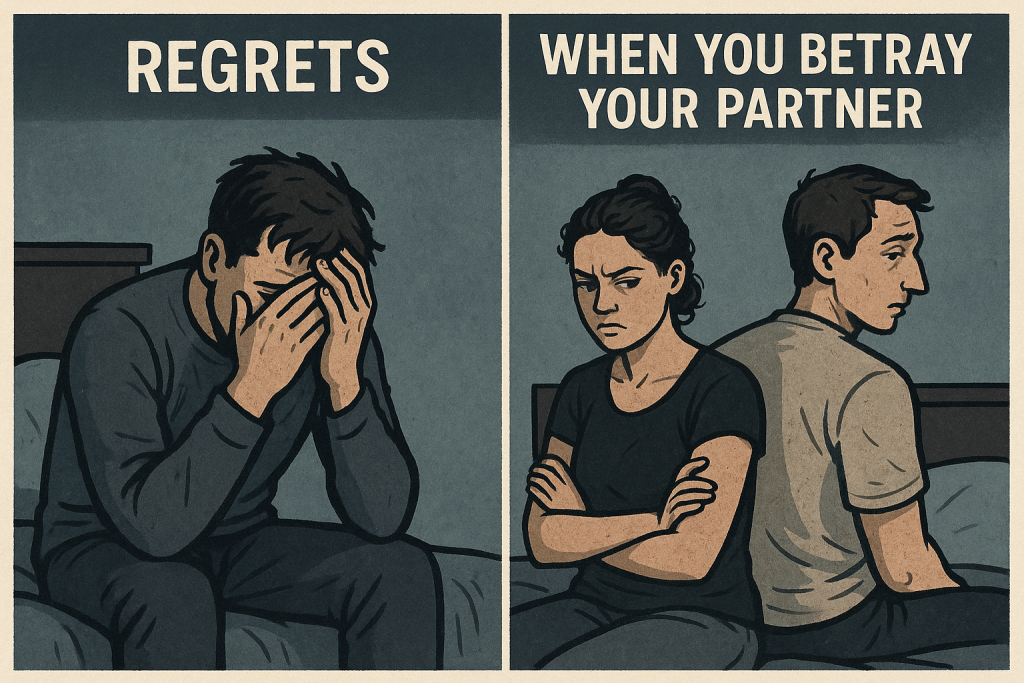⏲️ Estimated reading time: 13 min
👉 “I Cheated on My Partner: What Are My Regrets Afterward?”
Regrets After Cheating: What Happens When You Betray Your Partner. Cheating leaves behind more than broken trust it creates deep regrets that haunt both partners. This post explores the emotional, psychological, and relational aftermath of infidelity, uncovering the most common regrets and lessons learned when betrayal shatters love, respect, and stability.
Regrets After Cheating: What Happens When You Betray Your Partner
Cheating is one of the most destructive actions in a relationship. It goes beyond the physical act it’s a betrayal of trust, intimacy, and promises. At first, it may feel like a secret thrill, an escape, or a moment of passion. But once reality sets in, the weight of what you’ve done becomes impossible to ignore.
Regret after cheating is not simple. It’s not only about “I wish I hadn’t done it.” It’s layered full of guilt, shame, fear of consequences, and the painful realization of what has been lost. For many, the regret becomes a lifelong burden that changes how they see themselves and how others see them.
In this post, we’ll explore in-depth what regrets usually follow cheating, why they hit so hard, and how they affect your life, your partner, and the relationship as a whole.
1. The First Wave of Regret: Realizing the Damage
When the act of cheating is over, there is often a strange silence. The adrenaline fades, the temptation feels less appealing, and reality sets in. That’s when the first wave of regret comes crashing.
You realize that what seemed exciting for a few moments may have just cost you the love, trust, and stability you once had. Even before being caught, many people feel the guilt instantly.
- The regret of betraying love: You know you stepped outside the boundaries you both agreed upon.
- The regret of disrespect: Your partner trusted you, and you broke that trust in one selfish decision.
- The regret of secrecy: Hiding the truth and living with the lie becomes a heavy emotional burden.
This first wave is brutal because it forces you to see that the thrill wasn’t worth the cost.
2. Emotional Regrets: Guilt and Shame
The emotions after cheating are often overwhelming. Two of the strongest are guilt and shame.
- Guilt is internal it’s the heavy feeling that you did something wrong, that you’ve hurt someone who didn’t deserve it.
- Shame is external it’s the fear of what others will think of you if they find out.
These emotions manifest in different ways:
- Trouble sleeping at night.
- Constant overthinking and replaying the event in your mind.
- Avoiding your partner’s gaze because you know you’re hiding something.
- Feeling sick, anxious, or restless around your partner.
The regret deepens as you realize these emotions won’t just go away. They stay with you, haunting your daily life.
3. Relationship Regrets: Losing Trust
Perhaps the most devastating regret after cheating is the realization that you may never regain your partner’s trust.
Trust is fragile. It can take years to build but only seconds to destroy. Once broken, it’s almost impossible to return to the way things were before.
The regret here isn’t just about losing your partner’s trust it’s about losing the security of knowing that you were once seen as loyal and dependable. Now, your partner doubts your words, questions your actions, and may always wonder if you’re hiding something.
4. Regret of Hurting Someone You Love
Most people cheat not because they stop loving their partner, but because of temptation, weakness, or seeking excitement. That’s why one of the biggest regrets afterward is the pain caused to the very person you still care about.
- You regret seeing them cry.
- You regret imagining their heartbreak when they find out.
- You regret realizing you’ve damaged their ability to trust future partners.
Hurting someone who gave you love, loyalty, and their best self is often the deepest scar left by cheating.
5. The “Was It Worth It?” Regret
When you compare the short-lived excitement of cheating with the long-term damage, the answer is almost always: It wasn’t worth it.
The regret of weighing:
- A few hours of passion → against years of love and commitment.
- A secret fling → against your partner’s respect and trust.
- A temporary escape → against permanent scars in the relationship.
The imbalance becomes painfully clear. Many cheaters look back and wish they could erase the decision because the cost far outweighed the benefit.

6. Self-Image Regret: Losing Who You Thought You Were
Cheating doesn’t only change how your partner sees you it changes how you see yourself.
Many people regret that they can no longer view themselves as the “faithful, loyal partner” they believed they were. They now see themselves as someone capable of betrayal, dishonesty, and weakness.
This shift in self-image can be devastating:
- You regret losing your sense of integrity.
- You regret becoming someone you once swore you’d never be.
- You regret realizing you are now part of a group of “unfaithful people” you once looked down on.
This kind of regret eats at your identity, making you question your values and character.
7. Regrets About Communication: What You Should Have Said Instead
One of the hardest realizations is knowing that cheating could have been avoided if you had communicated openly.
Many people cheat because they feel:
- Unloved or unappreciated.
- Bored in the relationship.
- Attracted to someone new.
- Misunderstood or disconnected.
Instead of addressing these feelings honestly, they chose cheating. And afterward, the regret is overwhelming:
- “I should have told my partner how I felt.”
- “I should have asked for what I needed.”
- “I should have left if I wasn’t happy.”
The regret of silence becomes heavier than the regret of confrontation.
8. Regrets of Consequences: Breakup, Divorce, and Family Impact
The practical consequences of cheating can be devastating and the regrets that come with them are life-changing.
- Breakups and divorce: Losing a partner, a home, and a shared life.
- Children affected: Regret grows when children lose stability because of a parent’s actions.
- Financial loss: Divorce settlements, lawyer fees, or even losing a home.
- Reputation damage: Friends, family, and community may never see you the same.
When these consequences pile up, the regret shifts from emotional pain to tangible losses that change your life forever.
9. Regrets of Comparison: Realizing What You Lost
After cheating, many people start comparing what they had with what they risked it for. And the regret becomes unbearable.
- You regret losing a partner who was loyal.
- You regret losing someone who accepted you with your flaws.
- You regret risking a relationship that took years to build for someone who may not even care about you.
The comparison is brutal because it reveals how blind you were in the moment of weakness.
10. Regret of Living With Secrets
Some cheaters are never caught, but they live with the constant fear of being discovered. This, too, creates regret.
- You regret having to lie.
- You regret hiding your phone or deleting messages.
- You regret being unable to share your full life with your partner.
Living with secrets is exhausting. Many regret cheating simply because the stress of hiding it becomes unbearable.
11. The Long-Term Regret: When Time Doesn’t Heal
Unlike some mistakes, cheating is rarely something that time heals. Even years later, the regret lingers.
- Anniversaries remind you of what you broke.
- Small fights trigger guilt about your past betrayal.
- New relationships may carry the weight of old regrets.
Cheating becomes a permanent chapter in your story, and the regret is a shadow that never fully disappears.
12. Lessons Hidden in Regret
While regret is painful, it also teaches powerful lessons:
- The importance of communication over silence.
- The value of loyalty and commitment.
- The reality that temptation fades, but consequences last.
- The need to take responsibility and rebuild trust if possible.
The regret after cheating can destroy you or it can transform you into someone who never makes the same mistake again.
Cheating may seem like a moment of passion, but the regrets afterward are lifelong. They hit in layers guilt, shame, loss of trust, and the pain of knowing you hurt someone who loved you.
Regret after cheating isn’t just about the act. It’s about the permanent damage left behind on your partner, on the relationship, and on yourself.
If you cheated, your regrets will likely never fully disappear. But acknowledging them, learning from them, and never repeating the mistake is the only way to move forward.
No Regrets After Cheating – What Does It Really Mean?
👉 “What Does It Mean If You Have No Regrets After Cheating on Your Partner?”
No Regrets After Cheating – What Does It Really Mean? Most people feel guilt and regret after cheating but what if you don’t? This article explores what it truly means when infidelity leaves you without remorse, uncovering the psychology, relationship dynamics, and hidden truths behind a lack of regret.
Cheating is widely seen as one of the deepest betrayals in a relationship. It usually comes with pain, broken trust, and powerful emotions like guilt and shame. Most people who cheat experience regret afterward, realizing the harm they caused.
But what happens when you cheat and feel no regret at all?
This situation is more complex than it seems. A lack of remorse might reflect disconnection, narcissism, or cultural views about relationships. It could also signal that the relationship was already emotionally dead long before the act of infidelity.
In this post, we’ll explore what it truly means when someone cheats and yet doesn’t feel guilty or regretful.
1. Understanding Regret After Infidelity
Regret is the emotional response that follows when we realize we’ve caused harm or made a mistake. After cheating, regret typically arises because:
- You hurt someone you care about.
- You broke trust.
- You violated your own values.
- You jeopardized the stability of your relationship.
When regret is absent, it usually signals a deeper psychological or relational issue.
2. Lack of Emotional Attachment
One common reason for the absence of regret is a lack of emotional connection to the partner.
If a relationship has become:
- cold,
- loveless,
- or based only on routine,
then cheating may not carry the same emotional weight. The act isn’t seen as betrayal, but simply as something irrelevant to an already disconnected bond.
In this case, the person doesn’t regret cheating because they no longer feel emotionally tied to their partner.
3. Moral Detachment and Beliefs About Infidelity
Not everyone sees cheating as a moral crime. Some people consider sex purely physical, without deep emotional meaning. For them, infidelity doesn’t equal betrayal.
This perception can be shaped by:
- Culture – in some societies, cheating is tolerated or even normalized.
- Social circle – friends or peers who normalize casual infidelity.
- Personal experiences – if someone grew up around unfaithful relationships, they may view it as “just the way things are.”
So, a lack of regret may simply reflect different personal or cultural values.

4. Narcissism and Extreme Selfishness
Another explanation is narcissism. Person with narcissistic personality disorder often:
- place themselves at the center of everything,
- lack empathy for others,
- see relationships as resources rather than partnerships.
For a narcissist, cheating isn’t a betrayal it’s simply a personal choice to seek pleasure. That’s why they feel no guilt and no remorse.

5. The Relationship Was Already Dead
Sometimes, the lack of regret means the relationship was already over emotionally. Even if the couple still lives together, one partner may have mentally checked out long before the affair.
In that case, cheating isn’t seen as betrayal but rather as the first step toward moving on.
6. Lack of Empathy and Conscience
In more extreme cases, not feeling any regret can be a red flag for low empathy or even antisocial personality traits.
Some people are capable of lying, cheating, and manipulating without experiencing guilt. For them, the focus is always on personal gain, not the emotional cost to others.
This doesn’t always mean a full-blown psychological disorder, but it signals an alarming emotional gap.
7. No Regret as a Signal of the End
When someone cheats and shows no regret, the message to their partner is clear:
“I don’t care about you or this relationship.”
The absence of remorse is often the final confirmation that the relationship is over. Without empathy or desire to repair the bond, rebuilding trust becomes impossible.
8. How the Betrayed Partner Interprets It
For the betrayed partner, learning that their significant other has no regrets is twice as painful.
It doesn’t just mean they were cheated on it means they don’t even matter enough for the cheater to feel remorse. This can make the victim feel invisible, unimportant, and disposable.
Often, this revelation pushes people toward ending the relationship for good.
9. When No Regret Means Brutal Honesty
Interestingly, the absence of regret isn’t always purely negative. In some cases, it represents complete honesty.
The person is admitting:
- they don’t love anymore,
- they don’t want to continue,
- they are ready to move forward without guilt.
While hurtful, this level of honesty is sometimes better than fake apologies or false promises.
10. What to Do If Your Partner Has No Regrets
If you discover your partner cheated and feels no regret:
- Reevaluate the relationship – is there any love or respect left?
- Set boundaries – decide what you’re willing (or not willing) to accept.
- Seek clarity – try to understand why they feel no remorse.
- Choose your future – often, the healthiest choice is walking away.
Not feeling regret after cheating says a lot. It may mean the relationship no longer has value, that the cheater lacks empathy, or that they don’t see infidelity as wrong. In any case, it’s a powerful warning sign.
Healthy relationships are built on respect, love, and responsibility. When those disappear and regret doesn’t exist continuation is no longer sustainable.
🔔 For more tutorials like this, consider subscribing to our blog.
📩 Do you have questions or suggestions? Leave a comment or contact us!
🏷️ Tags: cheating regrets, infidelity consequences, relationship betrayal, emotional aftermath, rebuilding trust, guilt and shame, relationship mistakes, cheating psychology, self-reflection after cheating, relationship advice no regret cheating, infidelity psychology, relationship betrayal, lack of empathy, narcissism in relationships, cheating without guilt, relationship advice, toxic love, ending relationships, partner betrayal
📢 Hashtags: #CheatingRegrets, #RelationshipAdvice, #Infidelity, #TrustIssues, #EmotionalHealing, #LoveAndBetrayal, #GuiltAndShame, #LifeLessons, #RelationshipMistakes, #MovingForward #NoRegretCheating, #Infidelity, #Relationships, #ToxicLove, #Betrayal, #Psychology, #Narcissism, #TrustIssues, #LoveAndRespect, #Breakup
Only logged-in users can submit reports.
Discover more from HelpZone
Subscribe to get the latest posts sent to your email.

